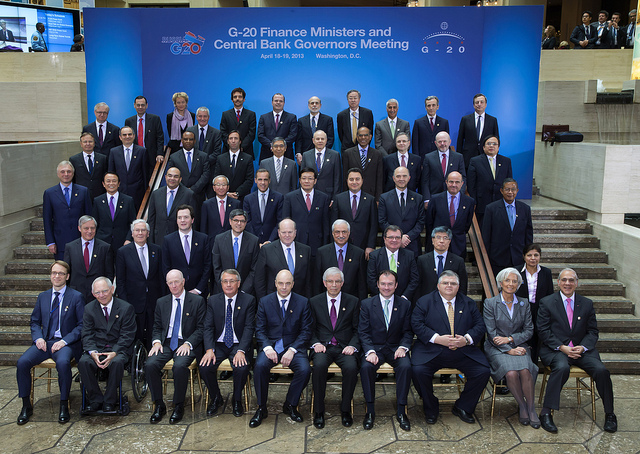Finding a way to end legal tax evasion was the theme announced for the G20 Finance Ministers and Central Bankers Meeting in Moscow over the weekend, in preparation for the G20 Moscow Summit this coming September.
The sums lost to public treasuries through corporate tax leakages are stupendous. A 2011 study by the Tax Justice Network estimated the cost as in excess of US$3.1 trillion. When public austerity measures have created a world youth employment crisis, and sabotaged Greece, Spain, Portugal and the economies of other countries, stopping transnational corporations from stuffing revenues into tax havens and hiding profits from tax collectors should have wide support.
Why should citizens pay more so that corporations can pay less?
In Moscow, ministers and governors had before them an OECD report about increasing the tax take from multinational corporations. The OECD have been gathering a list of countries prepared to share information on how companies are taxed, and how much they pay. This is all to the good, but too slow, and not nearly enough.
Multinational corporations have an established set of techniques designed to avoid and evade taxes that have been well documented by the U.S. Congressional Research Service. Making these techniques illegal at the international level is needed, urgently.
The OECD report uses technical language to describe real problems. What it calls the erosion of the tax base, refers to the huge Internet-based companies such as Google, Amazon, or Apple, that make money in countries without paying taxes in those countries. Amazon may put Canadian booksellers out of business and inhibit domestic publishing, but like other digital giants, while it has Canadian customers, it pays little or no Canadian corporate income taxes.
The OECD focuses on what is calls profit-shifting. This is polite language for legal tax fraud. In a common practice, a company makes a loan to a subsidiary in a lower tax jurisdiction. The subsidiary pays interest on the loan and deducts it from its taxable income as a business expense. In some jurisdictions, under favoured treatment for dividends, the parent company then deducts the interest it receives. To summarize, a bookkeeping operation doubles the amount of tax not paid.
The main technique used by multinational corporations is to set artificial prices for internal transactions so as to book profits in low-tax or no-tax jurisdictions. This process, known as transfer pricing, suggests that corporate income taxes may not be the best way to get multinationals to pay their fair share. Instead, taxes on capital (corporate debt and equity) and financial transaction taxes may offer the most promise for defeating corporate tax evasion.
The OECD approach to corporate tax reform is to patch up its model tax treaty approach. Using promises of investment to follow, for decades the OECD has been encouraging countries to sign bilateral tax treaties. These are designed to protect corporations from double taxation of multinational profits (while as we see above, double non-taxation has become a problem). It makes little sense, particularly for countries with extractive industries (or foreign-owned manufacturers) to sign such deals. Poor countries with extractive industries are being gouged around the world as figures from the Revenue Watch Institute show.
Countries own the resource, and should sell it for the world price, charging steep taxes on producers for extracting the non-renewable resource.
Originally designed to meet the needs of American multinationals, bilateral tax treaties rest on the erroneous assumption that companies that organize the workforce to take money out of the economy are the ones that create wealth, and deserve preferential tax treatment, not the people who do the work, and pay dearly, for the non-payment of taxes by corporations.
The principle of paying taxes on economic activity where it takes place needs to replace the principle of paying taxes where corporations pay the least. Treating multinationals as a sole enterprise rather than as a fictional group of separate companies is entirely feasible. What is required is that a multilateral approach to corporate taxation be substituted for the bilateral tax treaty approach.
Politically, the analysis and debate of corporate taxation needs to be moved out of the OECD to the United Nations where all countries are present, and not just the major economic players regrouped in the G20. Putting resource taxation into context means major political issues of violence, corruption and armed conflict in resource extraction jurisdictions get addressed and not just the revenue needs of the wealthy nations.
Duncan Cameron is the president of rabble.ca and writes a weekly column on politics and current affairs.
Photo: IMF Photo/Stephen Jaffe/flickr




